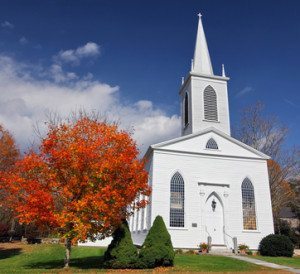How To Use Religious Records In Your Genealogical Research

Throughout the centuries and in locations ranging from early Europe to colonial America through the early 20th century, churches have been the centers of lives and communities. In many cases, even if an individual wasn’t particularly religious, he or she still regularly attended services due to laws and social conventions. One of the central locations that life’s major events were recorded was by a person’s local church or parish. From baptisms to marriages to deaths, and in some cases even interesting life anecdotes, it’s possible to learn about your ancestors through church records. Here’s what you need to know to get started with genealogical research using religious records.
But which church should I look at?
With America’s blended families, it’s possible that you’ll find ancestors in the same family tree with a wide range of religious affiliations. In some cases, the answers will be more obvious than others. For example, ancestors from Rome are likely Roman Catholic; those from early Pennsylvania stand a good chance of being Quakers; in England, most people after the reign of Henry VIII belonged to the Church of England; family residing in Massachusetts in 1630 are likely to have been Calvinist; and the Salt Lake City region is a hot spot for LDS families. In other cases, it’s simply impossible to know. Regardless, there are some simple ways to determine religious affiliations:
- In what cemetery is your ancestor buried? Often, cemeteries belonged to a specific denomination and even church.
- Do you have information about other members of the family? Members of a family often share their faith.
- Check obituaries, wedding announcements, and engagement listings for details of a church where the people were members or where ceremonies were held.
- If you have detailed marriage records that include the name of the official, it may be possible to determine his or her religious affiliation through church or historical records.
- Funerary cards and other items affiliated with mourning and funerals may suggest a church or presiding clergy.
- Consider geography. What churches existed in your ancestor’s locale during his or her lifetime? It’s much more likely that they walked to the church that was 2 miles away each Sunday than the one that was 10 miles away.
- In some cases, census records may contain religious information.
What to do with religious records
Once you’ve determined your ancestor’s religious denomination, it’s important to determine which congregation he or she was part of. The individual church may maintain historical records, or be able to advise you of where they are stored. Depending on the religion, often individual churches are part of a larger organization (for example, a parish, ward, or diocese depending upon the denomination).
Working at that level may also give you access to broader historical records, and help you clarify the evolution of that church in a specific region. Sending an email or written letter is often a great way to get started. It's helpful to remember that many churches are small and understaffed, or have no staff at all. Generally speaking, pastors and their assistants are helpful in responding to requests but you’re more likely to get a detailed response to a written query than to a phone call or an in-person visit, unless those are pre-arranged.
Further resources
The genealogical community has done an excellent job centralizing this truly dispersed aspect of genealogy research. We recommend the following reference points to get started in learning more about sources of information about religious records for your ancestors.
Cyndi’s List: An outstanding web-based site that gives recommendations of where to find resources by denomination and religion.
Church of Latter Day Saints Resources: The LDS Church has some of the most extensive genealogical collections in the world. Two helpful places to start include the LDS Genealogy Forum and Family Search.
Catholic Resources: Helpful resources for those seeking Catholic ancestors include Catholic Genealogy and the Catholic Family History Society.
Judaism Resources: If your family tree includes ancestors who were Jewish, begin your search at JewishGen.Org.
If you’re working to locate historical or religious records related to an ancestor, consulting a professional genealogist may be the solution you’re looking for.
